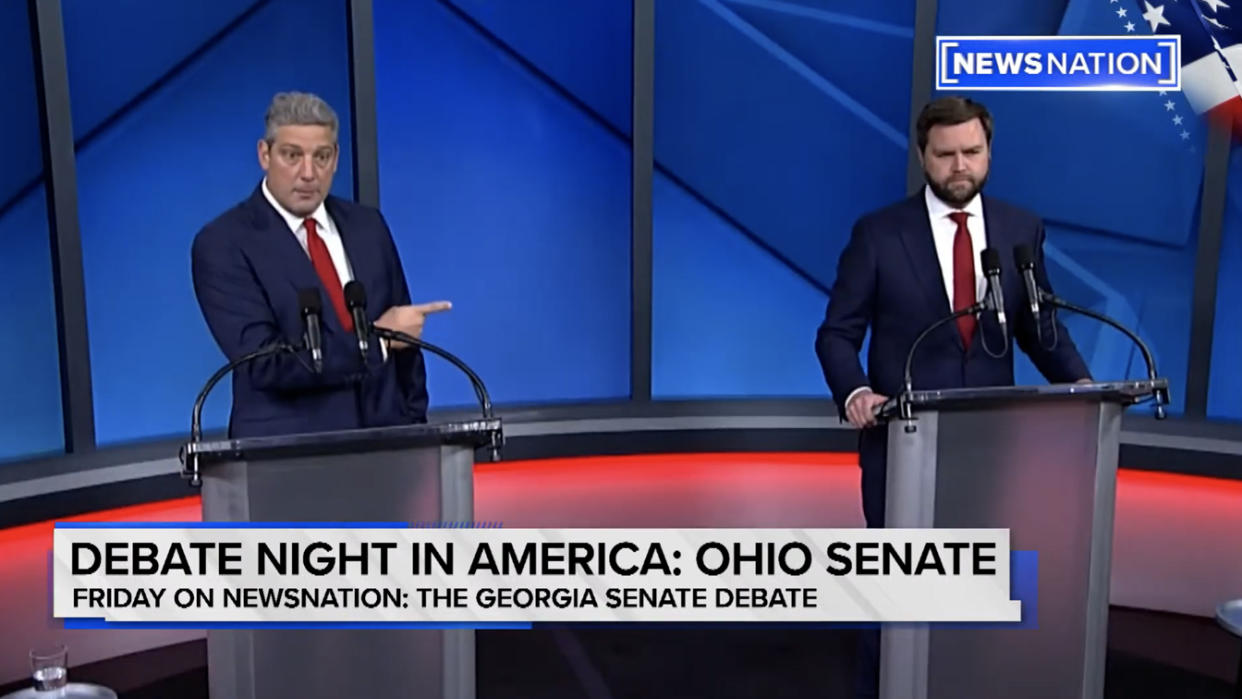J.D. Vance and Tim Ryan clash in Ohio Senate debate over who is 'moderate' and 'extreme'
WASHINGTON — At different points during Monday night’s debate, the two candidates to represent Ohio in the U.S. Senate favorably referenced Rob Portman, whose imminent retirement leaves open the seat now furiously contested by Rep. Tim Ryan, the Democratic nominee, and his Republican opponent, J.D. Vance.
At a time of intense polarization, Sen. Portman harks back to a somewhat more moderate mood in Washington. Never much of a Trump administration critic, Portman was instrumental in brokering a deal on President Biden’s $1 trillion infrastructure bill. He was also one of only two Republicans in the Senate to vote in favor of confirming Biden’s nominee to lead the Bureau of Alcohol, Tobacco, Firearms and Explosives. Though an unabashed conservative, Portman does not engage in conspiracy theories or Twitter feuds.

Ryan and Vance each tried to cast themselves as similarly moderate, focused on restoring Ohio’s standing as a manufacturing epicenter while curbing crime and the fentanyl epidemic. With only one debate scheduled between them, and polls showing the two in a virtual tie, Monday was an opportunity for the kind of moment that can boost a candidate across the finish line.
Ultimately, neither Ryan nor Vance achieved the goal. Each threw hard but predictable jabs at the other’s professional record, with Ryan depicting Vance as a Silicon Valley elitist and Vance criticizing Ryan for the two decades he has spent in the House of Representatives.
“I wish that you were the reasonable moderate you said you were,” Vance said of Ryan, whom he lashed tightly to Democratic congressional leaders Nancy Pelosi and Chuck Schumer, exaggerating the congressman’s positions on abortion, immigration, racial justice and transgender rights.
“The extremist here, Tim, is you,” Vance said during one heated exchange.

Ryan seemed faltering at times. On the whole, Vance showed somewhat more vehemence, but it is not clear that his performance will be enough to convince undecided voters, some of whom may not be sure whether he is the maverick populist who authored “Hillbilly Elegy” and criticized then-President Donald Trump or — once his political ambitions came into focus — the ardent Trump supporter who echoed the defeated president’s conspiracies about the 2020 election.
“You’re from Silicon Valley,” Ryan said at one point, referencing Vance’s work for venture capital firms in the San Francisco Bay Area. “You don’t understand what’s going on here in Ohio.”
During a recent rally for Vance, even Trump joked about Vance’s about-face, mocking the Yale Law School graduate for “kissing my ass.” Ryan eagerly reprised the line on Monday, telling Vance that “Ohio needs an ass kicker, not an ass kisser,” in what appeared to be the debate’s most popular line on social media.
With the midterm elections now less than a month away, Ohio has emerged — along with neighboring Pennsylvania and nearby Wisconsin — as a key battleground that will help determine control of the Senate. Ryan distanced himself from Democratic leadership in Washington, agreeing that Biden should not seek reelection in 2024.
“I’d like to see a generational change,” Ryan said, though he did not clearly answer a question later in the debate about whether Schumer should remain the Democratic leader in the Senate. He also said Vice President Kamala Harris was “absolutely wrong” when she declared last month that the border with Mexico was “secure.”
Throughout the summer, Democrats have relied on anger over the Supreme Court’s decision in Dobbs v. Jackson Women’s Health Organization, which overturned the 1973 ruling in Roe v. Wade that legalized abortion, to help blunt Republicans’ momentum heading into the midterms. But there are signs that abortion is fading as an electoral issue at precisely the wrong moment for Democrats.

Reproductive choice came up, as expected, during Monday’s debate, and both candidates seemed prepared with familiar arguments unlikely to convince the unconvinced. About Sen. Lindsey Graham’s controversial national abortion ban proposal, Vance said that “some minimal national standard is totally fine with me.”
During a discussion about the case of a 10-year-old Ohio girl who had been raped and was forced to travel to Indiana to legally obtain an abortion, Vance turned the discussion into one of illegal immigration, since the alleged rapist was an undocumented immigrant.
“Do your job on border security,” Vance flatly told Ryan.
Vance also had his opponent on the defensive about crime, an issue on which Republicans believe they have the more compelling message. Using racially charged rhetoric popular with other conservatives, he cast Ryan as an ally of “the BLM riots,” a reference to the Black Lives Matter racial justice protests that shook the nation in the summer of 2020.
“I’ve tried to be a part of the solution here,” Ryan answered somewhat defensively about the issue of public safety. Like many other Democrats, he has had to rebut false charges that he is in favor of defunding the police. The charge appears to have been especially potent in Wisconsin, where the perennially unpopular incumbent Sen. Ron Johnson is using attacks on crime and policing to open a narrow but consistent lead against Democratic candidate Mandela Barnes.
Ultimately, it was difficult to see how either candidate would benefit from the debate, given that each gave his opponent plenty of fodder for the kinds of partisan attacks that will dominate Ohio airwaves in the weeks to come. Perhaps a series of debates would have let the candidates more clearly articulate their positions, but Vance would agree to only a single debate, in keeping with an emerging trend among Republicans.
